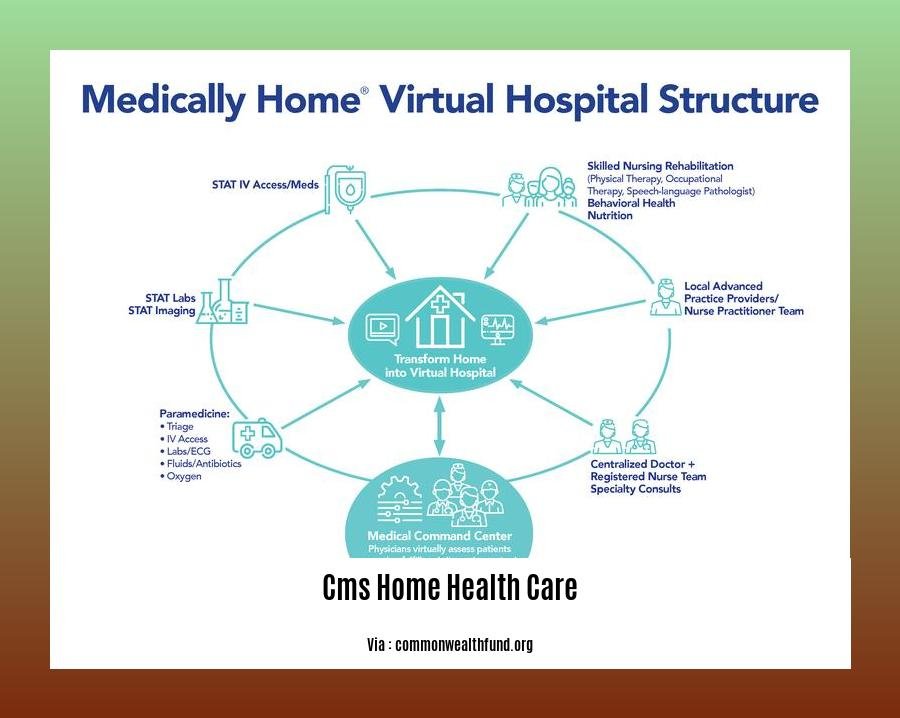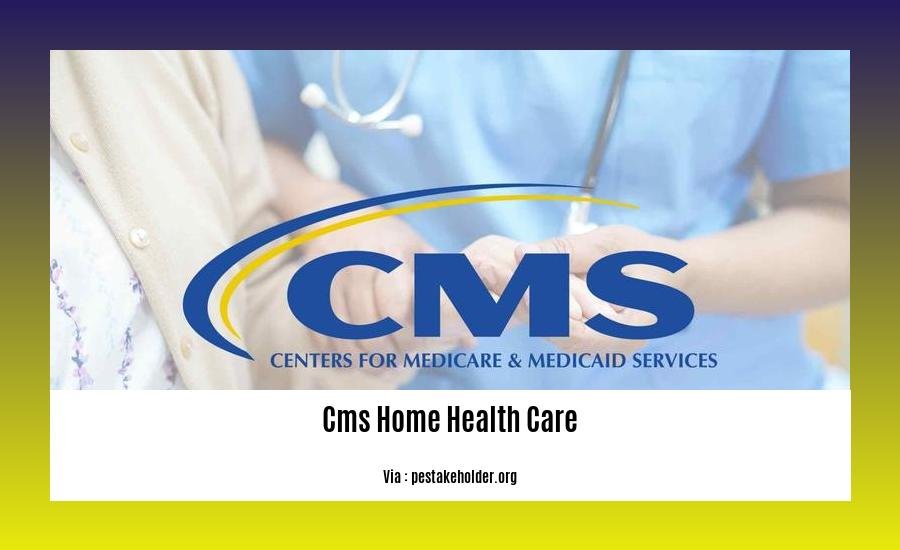Navigating the complexities of CMS home health care regulations can be a daunting task for providers. This comprehensive guide has been meticulously crafted to empower you with the knowledge and insights necessary to ensure compliance and deliver exceptional patient care. With a clear understanding of these regulations, you can optimize your operations, mitigate risks, and elevate the quality of services provided to your patients. [- CMS Home Health Care Regulations: A Comprehensive Guide for Providers] will equip you with the tools and information you need to thrive in the ever-evolving landscape of home health care.
Key Takeaways:
- HHAs provide medical care in patients’ homes.
- Medicare and Medicaid cover medically necessary home health services provided on a part-time basis.
- Services include skilled nursing, physical therapy, occupational therapy, and speech therapy.
- CMS regulates HHA billing, payment, and quality.
- CMS’s Home Health Quality Measures assess care initiation and outcomes.
- CMS’s Home Health PPS determines payment for services.
- CMS’s Care Compare website provides information on HHA quality ratings.
CMS Home Health Care

Navigating the world of CMS home health care can be complex. As a provider, it’s crucial to understand the regulations and guidelines set forth by the Centers for Medicare & Medicaid Services (CMS) to ensure compliance and quality care.
CMS’s Role in Home Health Care
CMS plays a vital role in regulating and overseeing home health care. Its responsibilities include establishing standards for:
- Billing and Payment: Determining reimbursement rates and payment methodologies for home health services.
- Quality: Implementing quality measures to ensure the delivery of safe and effective care.
- Enrollment: Setting criteria and processes for home health agencies (HHAs) to enroll in Medicare and Medicaid programs.
CMS Home Health Quality Measures
CMS has developed specific quality measures to assess the performance of HHAs. These measures include:
- Timely Initiation of Care: Measuring the time it takes for patients to receive their initial home health assessment after being referred.
- Patient Outcomes: Evaluating patient improvement in areas such as pain management, mobility, and overall health status.
CMS Home Health Prospective Payment System (PPS)
CMS’s PPS is a payment system that determines how much Medicare pays for home health services. The PPS is based on a patient’s diagnosis and resource utilization.
CMS Care Compare Website
CMS’s Care Compare website provides valuable information on the quality of HHAs. Consumers can access ratings and information on:
- Patient satisfaction
- Clinical outcomes
- Staffing and compliance
Key Takeaways
As a provider, understanding CMS home health care regulations is essential for:
- Compliance: Ensuring adherence to Medicare and Medicaid guidelines.
- Quality Improvement: Continuously striving to improve patient outcomes and meet CMS quality standards.
- Reimbursement Optimization: Maximizing reimbursement by understanding PPS billing rules and regulations.
By staying informed about CMS home health care regulations and guidelines, you can provide high-quality patient care, enhance your reputation, and ensure the sustainability of your HHA.
To deep clean your house, you need a professional cleaning service. Professional cleaners use the best cleaning solution and cleaning tools for the job.
Process for Obtaining Home Health Care

Figuring out home health care can be like navigating a maze. But don’t worry, we’ve got you covered with a simple, step-by-step process.
Step 1: Assess Your Health Needs
First, you’ll want to chat with your doctor and see if you qualify for home health care. They’ll check your health condition and see if you need skilled services like nursing or therapy.
Step 2: Choose a Home Health Agency
Next, pick a home health agency that fits your needs. Check their reputation, services, and location to find one that’s a good match.
Step 3: Get a Doctor’s Order
Your doctor will need to prescribe your home health care plan. This will include what services you need and how often.
Step 4: Submit a Referral
Once you have the doctor’s order, send it to the home health agency of your choice. They’ll review your information and schedule an assessment.
Step 5: Home Health Assessment
A nurse or therapist from the agency will visit you to assess your individual needs and create a customized care plan.
Step 6: Start Receiving Care
After the assessment, your home health care will begin. A team of professionals will come to your home to provide the services you need.
Key Takeaways:
- Home health care can be covered by Medicare if it’s medically necessary and ordered by a physician.
- Home Health agencies must meet specific quality standards set by Medicare.
- The Process for Obtaining Home Health Care is straightforward and involves assessment, choosing an agency, and receiving care.
Citations:
- Home Health Services
- Home Health Quality Reporting Program
Benefits of Home Health Care
Home health care offers numerous advantages that can significantly enhance an individual’s well-being and recovery:
Enhanced Comfort and Familiarity
Benefits of Home Health Care:
- A comfortable and familiar environment can promote a sense of ease and relaxation.
- Home health care provides treatment and recovery in the patient’s own space, allowing them to maintain their daily routine.
- The familiar surroundings can reduce stress levels and foster a sense of well-being, which is crucial for healing.
Personalized Care and Supervision
Benefits of Home Health Care:
- Home health care allows for personalized care plans tailored to the individual’s specific needs and preferences.
- This approach ensures that patients receive the right treatment and support at the right time.
- Regular monitoring and supervision by healthcare professionals help ensure timely interventions and address any changes in health status promptly.
Reduced Risk of Infection
Benefits of Home Health Care:
- Home health care significantly reduces the risk of infections compared to hospital or skilled nursing facilities.
- Fewer visitors and contact with other patients minimize the chances of exposure to pathogens.
- Maintaining a clean and hygienic home environment further reduces the risk of infection.
Improved Quality of Life
Benefits of Home Health Care:
- Home health care allows individuals to maintain their independence and autonomy within the comfort of their own homes.
- They can continue to participate in familiar activities and social interactions, enhancing their quality of life.
- Receiving care in a comfortable environment can reduce stress and anxiety, promoting overall well-being.
Cost-Effective Option
Benefits of Home Health Care:
- Home health care can be more cost-effective than hospital or nursing home stays.
- Care is provided in shorter intervals, reducing the overall cost of treatment.
- Home health care can also help prevent unnecessary hospitalizations and extended stays in healthcare facilities.
Key Takeaways:
- Home health care provides a comfortable and familiar environment for patients.
- It offers personalized care and supervision for optimal recovery.
- Home health care reduces the risk of infection, promoting patient safety.
- Patients can maintain their independence and improve their quality of life.
- Home health care can be a cost-effective option compared to other healthcare settings.
Sources:
- 10 Benefits & Advantages of Home Health care
- Benefits of Home Health Care
Quality and Oversight of Home Health Care
Navigating the complexities of home health care is easier when you understand the Quality and Oversight of Home Health Care. Let’s dive into the key aspects:
CMS Quality Strategy: Prioritizing Patient Safety
The Centers for Medicare & Medicaid Services (CMS) places patient safety at the forefront of its Quality Strategy. Their aim is to reduce harm, promote safety, minimize inappropriate care, and prevent harm.
Home Health Quality Reporting Program: Measuring Outcomes
CMS’s Home Health Quality Reporting Program employs various quality measures to assess home health agencies (HHAs). These measures encompass:
- Process of care
- Outcome of care (improvement and utilization measures)
- Patient satisfaction surveys
Home Health Agency Oversight: OASIS Data Collection
HHAs submit Outcome and Assessment Information Set (OASIS) data to a state repository. This data is crucial for quality measurement, reporting, and oversight.
- CMS ensures adherence to Medicare/Medicaid guidelines.
- Quality improvement plays a vital role in meeting CMS standards and improving patient outcomes.
Key Takeaways:
- Quality and Oversight: CMS oversees home health care through quality measures and OASIS data submission.
- Patient Safety: CMS’s Quality Strategy prioritizes patient safety, minimizing harm and promoting a culture of care.
- Quality Reporting: HHAs report quality measures to demonstrate their performance and adherence to standards.
- Provider Compliance: Compliance with CMS regulations ensures optimal patient care and reimbursement.
- Improved Outcomes: Quality improvement initiatives focus on delivering better patient outcomes.
Sources:
CMS: Home Health Quality Reporting Program
CMS: Quality Measures Used in the Home Health Quality Reporting Program
FAQ
Q1: What are the key regulations governing home health care providers under CMS?
Q2: How does CMS assess the quality of home health care services?
Q3: What payment system does CMS use for home health services?
Q4: How does CMS regulate home health agency enrollment and billing practices?
Q5: What are the key provisions of CMS’s Home Health Quality Reporting Program?
- Doubling 1/3 Cup: Quick Answer and Easy Kitchen Conversions - March 22, 2025
- J Middleton Unit (Abilene, TX): Inmate Search, Visitation, and Contact Information - March 22, 2025
- Ivermectin Dosage for Dogs: A Weight-Based Guide - March 22, 2025










